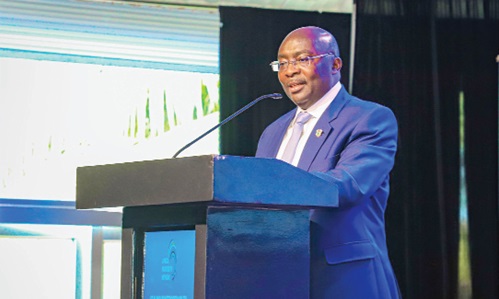The Vice-President, Dr Mahamudu Bawumia, has stated that expanding mobile money interoperability to the entire African continent will efficiently serve payment needs without having a common currency.
That, he said, was because the idea of a common currency, which was mooted for the continent since 1963, had been overtaken by the age of digital payment, adding that mobile money interoperability would allow citizens across the continent to trade seamlessly.
“Today, you can think about mobile money as a common currency if we make it inter-operable. We do not need to have that common currency before we get the benefits that we have been talking about since 1963,” the Vice-President stressed.
Dr Bawumia, who said this at a symposium organised by the Africa Prosperity Network (APN) in Accra last Friday, therefore, called on countries on the African continent to focus on mobile money interoperability.
The symposium was on the theme, “Scaling up interoperability, using mobile money to buy and sell across Africa.”
54 Countries, 41 currencies
Africa has 54 countries, 41 currencies and four exchange rate systems in operation. Most of the currencies are characterised by illiquidity and lack of convertibility which discourages intra-African trade.
![]()
Vice-President Dr Mahamudu Bawumia (arrowed) and other dignitaries after the symposium
tatistics provided by the African Union (AU), in its annual trade report (2020) indicate that intra-African trade remained low with an average of 13 per cent for intra-African imports and 20 per cent for intra-exports over the last seven years.
Though the share of the intra-export trade increased slightly from 18.2 per cent in 2013 to 19.6 per cent by 2020, the total value of intra-African exports declined during the same period.
Dr Bawumia observed that one of the major problems of achieving a common currency even in the contest of the West Africa Monetary Zone (WAMZ) was the difficulty of respective countries to attain the macroeconomic convergence criteria.
“We have not had a situation where all the member countries have been able to consistently achieve the key convergence criteria whether we are talking of inflation, the deficit, the reserves or exchange rate deprecation,” the Vice-President said.
In that regard, he called for a move away from the macroeconomics convergence criteria to digital payments convergence criteria.
Continental level
Dr Bawumia said Ghana had the expertise with a very sharp fintech to get this mobile money interoperability done at the continental level.
The Vice-President cautioned that the continent should not wait for everybody to be ready before it proceeded with mobile money interoperability, pointing out that it had to be done incrementally with the support of central banks which, he said, should be members of Pan African Payment and Settlement System (PAPSS) so that the settlement process could be done.
Dr Bawumia, who is the flag bearer of the New Patriotic Party (NPP), stressed the need for political will to push it and drive it at political levels.
Ghana system
The Governor of the Bank of Ghana, Dr Ernest Addison, said the country had moved from having interoperability among Automated Teller Machines (ATMs) to an interoperability system among mobile money, bank accounts and e-zwich cards.
“We are living in times where most Africans’ first interaction with the financial sector may be through their smartphones. We are also living in a time where Africans cross border payments are costly,” he said and added that the two scenarios presented an optimum opportunity for scaling up cross-border transactions on the continent.
The Executive Chairman of the APN, Gabby Asare Otchere Darko, said his outfit would present an outcome document to AU leaders who he indicated would gather in Accra on July 21, 2024.
He said the APN was committed to advocating a continent-wide interoperability and appealed to heads of governments, central bank governors and national communications regulators for their support.
“We are united behind a broader common vision of achieving an Africa that is economically integrated, inclusive and buzzing with opportunities for jobs, free enterprise innovation and shared prosperity for all.”
“More specifically, we are here because we see our handheld mobile device as the one tool that can make possible and meaningful, the push to create the world’s largest single market right here in Africa and as a necessity to building the prosperous Africa we want,” Mr Otchere Darko emphasised.
He said for a continent where the majority of the people earned their daily wage through micro, small and medium enterprises (MSMEs), “what is absolutely and undeniably clear to us is that the future of Africa is being defined by the freedom of inclusion, the abundance of opportunities and the ladder to prosperity which digital economy provides.”
Mr Otchere Darko said Africa represented close to 70 per cent of global money transaction value in 2021, while 50 per cent of adults in Sub-Saharan Africa made or received digital payments up from 34 per cent in 2017.
He said the average annual volume of transactions had also increased by 47 per cent since 2018 and the average value by 39 per cent. Mr Otchere Darko pointed out that some countries on the continent such as Ghana, Kenya, Zimbabwe, and Botswana had been able to introduce mobile money interoperability domestically and there should not be any reason why the same could not be achieved on the entire continent.

